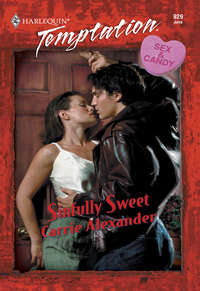
Полная версия
A Ready-Made Family

Jake knew chemistry when he felt it
Taking on three kids and a single mom was bad enough, but that complication he did not need, unless it led only to a fast, uncomplicated affair. He was betting that a cheap affair was strictly off-limits with Lia.
So back off now, man. You don’t need this.
Of course, that wasn’t what his sister had been saying since Jake’s return, with all her teasing about him finding a good woman and settling down. He’d claimed her brain had turned into romantic mush because of her wedding, but maybe she had a point.
He was thirty-nine and regimented in his ways. If he was ever going to give the marriage-and-family thing a legitimate shot, it should be soon. Never in his wildest dreams had he imagined hooking up with a woman with kids, especially when everything about them spelled trouble. Yet there was a certain efficiency about the situation that appealed, regardless of his ingrained habit of detachment.
One stop, no shopping.
A ready-made family.
Dear Reader,
There are times in a writer’s life when fiction and reality intersect. I began the NORTH COUNTRY STORIES miniseries several years ago, using memories of my hometown as a basis for certain aspects of the fictional town of Alouette. Little did I know that I’d soon be moving back.
I purchased a house and acreage on the river that bisects the town. Directly across the bay from me is a magnificent wooded peninsula dotted with a dozen small stone houses—my original inspiration for the cottages that play a prominent role in both this book and A Family Christmas (Harlequin Superromance #1239). Although the real cottages are empty, I often gaze up at them as I swim the river, imagining them populated by my fictional couples. But the only character who has actually visited is the skunk!
Visit www.CarrieAlexander.com for more on the North Country books—both the real and the imaginary.
Warmly,
Carrie
A Ready-Made Family
Carrie Alexander

ABOUT THE AUTHOR
Carrie Alexander began her writing career on a whim. Ten years later, she is the author of more than thirty books and a two-time RITA® Award finalist. The lifelong Michigander keeps busy working on her storybook cottage, where she paints anything that doesn’t walk away—which explains the lime-green garbage can and floral mailbox.
To Cyndy and Crystalyn
When the going gets tough,
the tough get going in the Grudge
CONTENTS
CHAPTER ONE
CHAPTER TWO
CHAPTER THREE
CHAPTER FOUR
CHAPTER FIVE
CHAPTER SIX
CHAPTER SEVEN
CHAPTER EIGHT
CHAPTER NINE
CHAPTER TEN
CHAPTER ELEVEN
CHAPTER TWELVE
CHAPTER THIRTEEN
CHAPTER FOURTEEN
CHAPTER FIFTEEN
CHAPTER ONE
AFTER TWO DAYS ON THE road, getting lost, breaking down and spending her remaining cash at McDonald’s to quiet the kids during the final stretch of their trip, was it possible that Lia Pogue’s luck could get any worse?
Absolutely.
Her empty stomach gnawed as she watched the ambling approach of her second worst nightmare.
“Mom, you’re crushing the map.” Lia’s ten-year-old son, Howie, tugged the gas station freebie out of her grip and refolded it with a pinched look of concentration. He’d been giving directions from the shotgun seat since they’d crossed the Mackinac bridge into the Upper Peninsula of Michigan, taking the job too seriously, as he did most tasks.
The cop circled Lia’s idling car, slowing to study the back end. She didn’t suppose he was admiring the vintage rust on the 1980 Impala they called “the Grudge” or the buckety-buck of a motor misfiring on its ancient pistons. Surreptitiously she rubbed her sweaty palms on her knee-length denim shorts, trying to keep the kids from seeing her nervousness. Was the uniform cop writing down her license plate number? What if it had already shown up on some sort of Most Wanted list?
That’s not possible. Larry doesn’t know we’re gone—yet.
“Mom?” warbled Sam from the backseat as her eyes followed the police officer’s circuit. Because she knew what was at stake, she’d forgotten to act jaded. Her mascara-thickened lashes had widened in alarm.
“Everything’s all right.” Lia had repeated some variation of the phrase for the past few days. Longer, actually, but she didn’t want to go there right now. She said it so often that the words came out even when it was clear that everything was wrong.
Everything except the most important fact: they were free.
Maybe not for long.
The cop tapped on her window.
She exhaled. “Don’t talk,” she told her kids before rolling down the glass. The Grudge had crank windows. For once, she was glad. She had something to do to distract herself from the tight ache wanting to burst out of her chest.
The officer tipped back his cap and peered into the car, taking in the jumble of discarded clothing, children’s toys and fast-food trash that had accumulated during the long drive north. “Everybody okay in there?”
“Yes, sir.” Don’t volunteer information.
“Ya, well.” He smiled, clearly a small-town cop because he didn’t flinch when Lia reached down beside her, toward the seat. He was looking at the map clenched in her son’s lap. “Gotchyerselves lost, eh?”
She sucked on the straw of Howie’s Coke to wet her dry mouth. “Sort of.”
“Whatcha looking for?” The neighborly cop leaned an arm on her car door. “I can give you directions to anyplace in the whole U.P.”
He was young, blond and rather goofy-looking with a Barney Fife face that was all nose and Adam’s apple with not much chin in between. His accent was even heavier than her old friend Rose Robbin’s—“ya” for “yeah” and “da” for “the.”
Nothing threatening about him, but Lia didn’t relax. Fugitives couldn’t afford to let down their guard.
“Thanks, but we’ll be fine.” She didn’t want him to know where she was headed. If Alouette was as small as Rose had said—and it certainly appeared to be from their hillside vantage point—he’d find out soon enough. Lia didn’t see any need for currying interest, even friendly interest. Not from any of the locals. After the first curiosity had passed, she hoped to knit her family into the fabric of small-town life so well that no one ever noticed them again.
Howie shoved his glasses up his snub nose. “This map doesn’t show Black—”
Lia gave him a look so fierce his voice froze midstream.
The cop tilted his head. “Sounds to me like you’re lost.”
The car’s engine rattled ominously. Lia hadn’t dared shut it down while they’d searched the map. If she didn’t put the Grudge into gear soon, it might give out again.
She thrust the soft drink at her son. “We were just taking a breather,” she said to the cop in a fake cheery tone, the one she’d used too often with her children the past several years. Kristen Rose, her four-year-old, was the only one who still fell for it. “We’ll be on our way now.”
The officer tilted his head to the right, checking out the backseat. Lia felt Sam’s clogs press into her spine through the car seat. Her teenage daughter’s long, skinny legs were doubled over and drawn up to her sulky face. She glared raccoon eyes at the officer over her kneecaps, as if daring him to question her.
Smile, dammit, Lia said silently in the rearview mirror. Just this once.
“I’m Deputy Corcoran.” He looked at Lia expectantly.
Lia met Sam’s accusing eyes in the mirror, then looked away. “Lia Howard,” she said almost too loudly. She wasn’t lying, not really. She’d been Lia Howard for the first seventeen years of her life. “And these are my kids.” She wasn’t going to give their names unless she had to.
Officer Corcoran tipped his hat. “Pleased to meetcha.”
Lia made a polite sound.
In the rear seat, Kristen stirred. The drive through twenty miles of backcountry forest had been so boring that she’d nodded off with a French fry clutched in her small fist. “Mommy? Are we there yet?”
“Not yet,” Lia said before Howie could chime in that, yes, they’d finally reached their destination, even if they couldn’t find Blackbear Road on the state map.
“How come we stopped? Is the Grudge broked again?”
“No, honey.” Lia’s eyes darted toward the officer’s face. Kristen didn’t completely understand the necessity of keeping quiet, especially around strangers. But she was learning. And that had taken another small chip out of Lia’s worn-down heart. “We’ll be there soon.”
“Not with this car,” the cop said. “The motor doesn’t sound too good.”
“I know. That’s why we call it the Grudge.” At his mystified look, she explained, “It’s from a horror movie. My daughter came up with the name. Because of the loud grinding sound the car makes when it revs up.”
“I getcha, I guess. I’m darn surprised you made it to town. The 525 might not seem like a steep road, but it’s got a long, gradual incline.”
“Luckily it’s all downhill from here.” Lia forced a chuckle as she gave a wave out the front window at the descent into the town proper.
They were perched on a hillside overlooking Alouette. The sight was a pretty one, if Lia had been in any shape to appreciate it. Interspersed among an abundance of summery green trees were the shingle roofs, cream brick and red sandstone of the quaint little town. Beyond, the blue water of Lake Superior stretched as far as the eye could see. A lighthouse perched at the tip of a finger peninsula pointing into the bay. Gulls circled bobbing boats in the small marina.
Officer Corcoran had straightened to take in the view, but he ducked back down to address her. “Didja know you have a busted taillight?”
“Oh.” She knew. But a working taillight was less crucial than replacing spark plugs and a fried fan belt—the emergency repair that had kept them stranded overnight in the middle of nowhere in a town called Christmas. “I’ll get it fixed as soon as I can,” she promised, which was honest enough considering soon was an adaptable word.
For how many years had she planned to leave her husband “soon”? After the divorce had gone through despite Larry’s attempts to block it, she’d learned a new definition of the word. Soon he’ll stop trying to hurt us. Soon the courts will understand. Soon we’ll get away.
“I shouldn’t let you go without a ticket, but…” The cop disappeared from her window to wave at a pickup truck that rattled by on the bumpy blacktop road. It shed flecks of rust like a dog shaking fleas. The young officer grinned. “See there? I gotta admit our department’s not a stickler when it comes to ticketing unroadworthy vehicles.” He squared his shoulders. “But it’s important to keep your family’s safety in mind.”
Lia swallowed. He had no idea. “I do, sir. Always.”
The young officer stepped back. “You be sure to get the vehicle fixed, ma’am. I don’t want to see it on the road again in this condition.”
“You won’t.” Lia let herself hope that she’d finally caught a break. “We don’t have far to go,” she added. “We’ll be there long before dark.” Kristen was fussing in the backseat, and Sam—bless her—passed over her precious iPod to keep her sister occupied.
“All right, then.” Officer Corcoran moved away from the car. “Make sure to watch your brakes on this hill. Speed limit’s twenty-five in town.” He squinted. “Are you positive you don’t want directions?”
“No, thanks.” Lia knew where she was going.
Anywhere that her ex-husband Larry Pogue was not.
ALOUETTE WASN’T LARGE enough to be lost in for very long. After creeping down the hill and through the handful of streets that made up the downtown area, they drove around until they found Blackbear Road on the northern side of town. Lia’s memory of the location of their destination was sketchy, pulled from years-old conversations with Rose Robbin about her hometown. Rose would have supplied better directions if she’d known they were coming, but Lia hadn’t told her. In fact, they hadn’t talked in nearly a month, when Rose had called to tell Lia she was getting married. Because her friend deserved uncomplicated happiness, Lia had oohed and aahed and kept her escalating troubles to herself.
Now she had no choice. She was desperate for a safe haven.
“This is it, Mom.” Howie stuck his head out the window to read the peeling board sign obscured by a thicket of underbrush. “Maxine’s Cottages.”
Relaxing her shoulders for the first time in an hour, Lia turned the car onto a twisting dirt-and-pebble road. Towering pines threw shadows across the Impala’s long hood. Hidden among the trees were small stone cottages, just as Rose had described. They seemed a natural part of the landscape. Their slanted roofs were thick with pine needles, the stone walls covered in moss, lichen and overgrown vines.
The road widened into a clearing near the largest structure, the central home with a plaque that denoted the office. A big black pickup truck was parked at a careless angle, taking up most of the space. Lia pulled in next to it and shut off the engine, which reluctantly gave up the ghost. Buckety-buck. Buck. Buck. The tailpipe popped. Exhaust smoke drifted by her open window, temporarily masking the fresh piney smell of the woods.
Lia breathed deeply anyway. They’d made it. Thank God.
“We’re here,” she announced.
The children stared in total silence.
“It’s not so bad.”
A protest burst from Sam. “We can’t stay here! It’s abandoned.”
“It’s not abandoned.” But the only signs of occupancy were the truck, limp curtains that fluttered in an open window of the stone house and a fishing pole and a rake leaning against a rail by the front door.
“Can we get out?” Howie asked.
“I’m not,” Sam said, crossing her arms across her chest and sliding even lower in the seat until only the blue-tipped spikes of her bangs showed. “I want to go home.”
“Then you’ll have to push the Grudge, because its engine won’t make the return trip.” Lia put on her cheery voice as she reached for the door handle. “Let’s go see if anyone’s home. Rose said there’s a river nearby. Can you hear it?”
“I do.” Howie’s door creaked as he pushed it open. He was small for his age, still a little boy despite the anxious personality and smarts that made him seem older than his years. One of Lia’s greatest wishes was to see Howie relax. To run and play, to learn how to be a boy without responsibility.
He looked eagerly at Lia across the hood, light reflecting off his glasses.
She stretched the kinks from her back. “All right. Go and explore.” She held back warnings about snakes and poison ivy and deep water. Howie didn’t have to be told. His caution was even stronger than his curiosity.
“Come on, Krissy, baby.” Lia took her youngest child’s hand as the girl slid out of the back seat. Sticky. Kristen’s lips were stained with orange soda pop. Lia grabbed a packet of wet wipes from the glove compartment and squatted to apply one to her daughter’s hands and face. Kristen blinked sleepy eyes as she looked up at the trees and sky. She was a slow riser.
Lia rubbed at Kristen’s small, plump mouth until only a faint orange shadow remained. She smoothed the girl’s rumpled T-shirt. “Want to knock on the front door for me?”
Kristen stared at the gloomy stone house. “Who lives there?”
“Rose Robbin does.” Or did. “Her mother, too. You probably can’t remember Rose—the dark-haired lady who was our neighbor? She used to babysit you when you were just a tiny little baby.”
“Uh-uh.”
“She babysat all of you kids.” Surly Rose had been a loner who’d gradually warmed up to the Pogues. She’d become Lia’s friend and confidante, the only person she could rely on. But when Rose’s father had died several years ago, she’d gone home to Alouette in Michigan’s U.P.—Upper Peninsula. They’d lost contact for a long while, until Rose had mailed a Christmas card the past December. Since then, they’d written and called a number of times. When Rose had first learned that Larry was still causing trouble, she’d offered Lia help any time she needed it.
Misgivings nibbled at Lia’s conscience. At the moment of crisis, with Larry threatening to sue her for custody of the children and even hinting that he’d snatch them away if he had to, she’d latched on to Rose’s offer as her only option. She and the kids had needed to disappear. According to Rose, Alouette was the type of place where you could do that.
Not the end of the Earth, the welcome sign had read on the way into town, but we can see it from here.
As much as Lia appreciated the isolation, she hadn’t expected to feel quite so stranded and alone. Maybe she’d thought Rose would greet them with an apple pie. Even though she had no idea they were coming.
Lia tried the cheery voice on herself. Won’t Rose be surprised that we’ve traveled hundreds of miles to land on her doorstep?
“Hey, Mom!” Howie called from the trees. “There’s more little houses over here.” He’d found a path. Through the thick stand of evergreens, Lia caught glimpses of him running from cottage to cottage. “Four on this side.”
Kristen looked up at Lia, her eyes glistening. “I don’t wanna live here, Mommy.”
Lia stroked Kristen’s hair. Her girl was usually more adventurous. The completely unfamiliar landscape must have thrown her off-kilter. “Let’s wait and see how we like it.”
“See?” Sam said peevishly from her slumped position inside the car. “Nobody wants to stay here.”
Lia took Kristen’s hand. “Would you like to join us, Sam?”
A huffy exhale came from the back seat. “Hell no.”
Lia’s mouth tightened. Samantha was fourteen and getting more rebellious every day. Their neighborhood in Cadillac hadn’t been the greatest, and if they’d come north for no other reason, Lia was relieved to get Sam away from the crowd of teenagers she’d taken up with back home. Sam might actually be correct about one of her litany of complaints—there’d be nothing to do in a small town like Alouette. At least nothing that her mother wouldn’t know about.
Lia was counting on that. She wanted her bright, lively daughter back—or some teenage semblance, anyway.
She shrugged. “Suit yourself, Sam.” Maybe she was copping out on her responsibilities as a mother, but now wasn’t the time to engage her eldest in a battle over language and attitude. Sam could sit in the car and stew. If they stayed in Alouette, she’d adjust to the idea. She’d adjusted to worse.
The thought was little comfort.
“Howie?” Lia finger-combed her own hair as she and Kristen walked to the front door of the stone house. She felt rumpled and creased, like a grocery bag that had been used too many times.
His voice drifted from the trees. “Yeah, Mom.”
“Just checking.”
“I’m over here. I found mushrooms.”
“Don’t eat them. And don’t wander off.”
There were three steps up to the front entry, a weather-beaten plank door with a placard that read Office. No doorbell, except for an old-fashioned dinner bell that hung from a rusty bracket. Lia knocked.
And waited.
She knocked again, looking around the run-down property. The cottages were placed in random order, tucked here and there in groves of pines, maples and birches. Chickadees and nuthatches hopped among the pinecones that littered the ground. Sam watched owlishly over the edge of the car seat, showing the whites of her eyes. Still no answer.
“Look, Mommy.” Kristen pointed to the bell suspended beside the door. “Can I ring it?”
“I guess so.” Lia lifted the girl, showing her how to tug on the short rope attached to the gong.
The sturdy metal bell rang out deep and loud. Kristen laughed at the sound and reached out again, but Lia stopped her. “Enough. If anyone’s home, they ought to have heard that.”
Kristen slid down. “Can I go with Howie?”
“All right.” Lia stepped away from the door and aimed her daughter toward the path through the overhanging trees. Kristen took off like a shot, much braver now that she was fully awake. Lia smiled at the enthusiasm, wishing her courage was as easily reinstated. “Howie, please watch out for Kristen.”
Lia waited until she heard their voices before giving in to her own curiosity. With one more glance at the Grudge, she walked around to the back of the house. Sam’s head had sunk below window level.
Lia inhaled. The sharp, spicy scent of pines filled her lungs. God, the air was fresh here. The house had no lush suburban lawn, only ragged patches of grass poking out from beneath a thick blanket of coppery pine needles. Inside a sagging wire fence, a patch had been cleared for a garden, the rich earth freshly overturned and planted with seedlings. The level area near the house became a slope that steepened down to a reedy riverbank.
Lia shielded her eyes. The dark river swirled and eddied, rushing white where submerged rocks had been worn silky and smooth by the constant flow. Cattails nodded in the breeze.
Despite the shabbiness, the setting was idyllic. A piece of paradise. Lia began to understand why Rose had returned despite her less-than-idyllic childhood. If Lia had grown up in a place like this, she might not have been in such a rush to leave home that she’d latched on to her first real boyfriend and mistaken his intense feelings for true, deep love.
Rose had told her own tale, those long evenings when they’d sat out on the small lawn of their apartment building, sharing a pack of cigarettes and the sad tales of their lives while the kids played Kick the Can. According to her, paradise wasn’t always what it was cracked up to be. But Rose had found a happy ending here all the same.
A happy ending was more than Lia dared to dream of. Even though a piece of paradise might be nice, she’d gladly settle for simple peace.
She sighed, rubbing her forehead. Had she made a mistake becoming a fugitive instead of trying to work things out within the law, even if that had already taken years and every cent she earned? It seemed so now, when she was tired and broke, but in her gut she knew that fleeing was the only way she and the kids had a chance at a normal life. If they’d stayed, Larry would have never let up.
Lia turned back to the house. She’d suspected Rose might be gone, but what had happened to her mother? And there’d been a brother, too, back from the Army. Or maybe it was the one who’d been in prison.
At the window, she made a visor with her hands to peer inside. No one in sight, but there was a table stacked high with gift boxes that probably contained enough small kitchen appliances to stock a department store.
She groaned. She should have brought a present. But what? A used coffeemaker? A blender that could only puree on low?
Dismayed with herself, Lia reached inside her shirt to rescue a fallen bra strap that was held together by a pin. She’d once been a genuinely cheerful girl—a cheerleader, even—with shiny blond hair and a set of days-of-the-week underpants. The most important appliance in her life had been her curling iron. So how had her life turned into a wreckage of broken-down motors and tatty undergarments?
She was startled by a deep male voice. “Find anything good in there?”
Her fingers clenched on the bra strap. A deflated but still serviceable pair of 34Cs was the answer that popped into her mind before she realized the man was referring to her spying through the window.
“I was looking for Rose.” She withdrew her hand from her shirt and tucked it in the pocket of her shorts. “Rose Robbin? Am I in the right place?”








